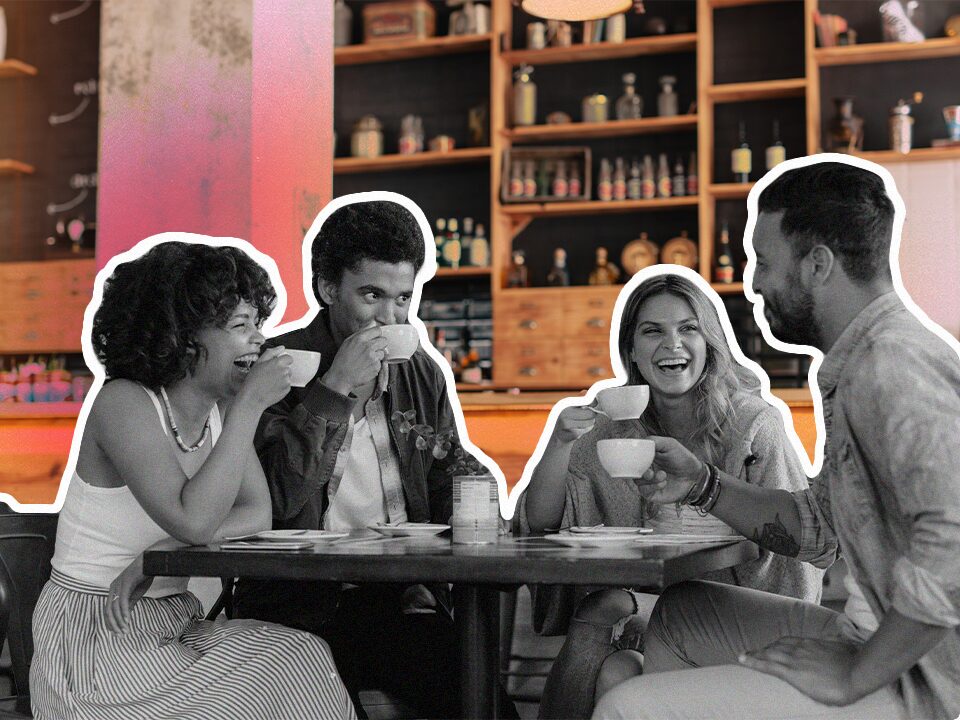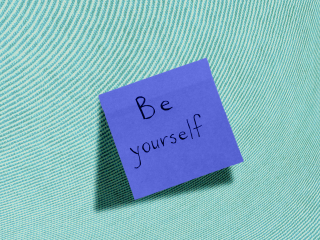Are Third Places the Cure for Loneliness?
Because the work-home-work grind isn’t helping you live your best life.
Going to work, back home, and back to work again and again can make you feel lonely as hell. That’s especially true if your home life isn’t ideal or you don’t connect with your coworkers sending those “this is the Mondayest Tuesday” memes. But fret not. Even if you feel like you’re on a (kinda depressing) loop, there is hope for more excitement, joy, and community. Allow me to introduce you to a little thing called third places.
Coined by sociologist Ray Oldenburg in 1982, third places are locations away from work and home where you gather to enjoy the company of people you know and friendly strangers.
You’ve probably witnessed the greatness of third places at some point, likely via the TV. You know Central Perk on Friends? Yep, that’s a third place. Same for Luke’s Diner in Gilmore Girls, the bar in Cheers, and that random diner in Sex and the City. If you’re lucky, maybe you know how nice it is to walk into your local library and be greeted with a smile and little chat from your favorite librarian. Or maybe you like to chill at the one stoop down the block that’s always vibrating with your neighbors’ laughter and music.
In a world where so many struggle with loneliness, lack of belonging, or physical isolation, third places can get you excited about your daily life, expand your horizons, and offer a sense of community thanks to the new (and familiar!) people you come across, says Miriam Kirmayer, PhD, clinical psychologist and friendship researcher.
And in excellent introvert news: Even if you don’t have in-depth conversations with others, just being in the presence of people or having quick little interactions (like small-talking with the barista making your coffee order or asking someone where they got their cool shoes) comes with loneliness-busting benefits, shares Minaa B., LMSW, therapist and social worker.
Before you start running around, trying to find a new neighborhood haunt, you’ll want to sift through your goals, interests, and any potential limitations in order to find the spot with the most potential for making connections with people who get you, Dr. Kirmayer and Minaa B. suggest. Some questions you can mull over include:
- What am I most interested in? Is it finding a place with great food, mocktails, books, or big-screen TVs?
- What’s something I’d love to do more of or learn to do?
- What parts of town do I appreciate, and how far am I willing to travel?
- What accommodations might I need in any given space?
- What kind of experiences or people do I want in my life?
- Is this place somewhere that other people will be actively trying to make friends too?
- What cadence of visiting a third place feels sustainable given the demands of my life?
- Would I feel safe in this new space?
If you need some specific ideas for where to go, here are some tried-and-true favorites.
1. Find some local entertainment.
“I like going to dive bars that have live music. Sometimes you have to pay a cover or ticket fee, but it’s usually not much, and the crowd is often regulars, friends of the band, or just music fans. I don’t drink, so your average bar or club doesn’t have much for me, but if there’s live music, I’m there. I try to go no matter what the music is, even if I’m not into the genre because you never know what you’ll find. I’ve been to spots that will teach you how to dance before the band plays, and it’s so much fun and gets you out of your comfort zone. It’s a great way to meet people who like the same stuff as you or people who are different and can open your perspective. All you have to do is turn to someone who seems cool and say, ‘This band is amazing, aren’t they? Have you been here before?’ And boom, you’ve made a friend!” —Emily Y., 26
2. Go somewhere pretty….
“I love this one local coworking space that has great coffee and is in a beautiful renovated old bank. I'll often go there with a friend or go alone, and I never know who I'll meet and what kinds of interesting projects and passions I'll hear about. Sometimes, part of the appeal of third places is absolutely the setting, even if it’s somewhat work-related. Places that have a certain sense of beauty or awe to them can draw people in and people get into the right headspace to actually connect and end up feeling a little inspired to make conversations, like chatting about the location itself. Very often, that's the opening to conversation.” —clinical psychologist Miriam Kirmayer, PhD
3. …or even to your typical errands spot.
“The convenience store is my third place because it feels like an extension of my home. I often walk past and just stop in because I spot a friend inside. It’s an accidental gathering place for us because we all live nearby and inevitably need something from the store daily or every couple of days. The guys who own the place (and their cat, Tom) are always there, and I’ve gotten to know them over the years of stopping in there. It’s nice to be able to connect with someone outside of your sphere (aka, my college) but still in the same physical community. No matter what time of day it is, I know I can stop in for a snack and some social interaction even if I don’t spot a friend inside, and it makes me feel a little less lonely knowing that this place is around the corner. ” —Evan M., 22
4. Relax at a does-it-all restaurant.
“A local restaurant/bar has become my go-to meeting place for last-minute family dinners, girls' brunches, hockey games, and more. We have a busy family with three tween and teenage kids, and having somewhere we can walk or drive to that everyone enjoys means it hits all our boxes. We also try to support local businesses, so it aligns with our community values as well. Although we don’t often plan to gather with other folks in the neighborhood, we usually see people we know there. We also go frequently enough that we are familiar with most of the servers and it feels kind of like where everybody knows your name.” —Miranda A., 41
5. Go where the dogs are.
“The dog park is the most amazing place of pure connection and positive energy because dogs have minds of their own, and they push you to engage with humans who you might not otherwise meet or interact with. It’s also great because it’s a third place that is so play-focused and one of the last ones that we have in society other than a bar or, if you have kids, a playground. I don’t even think you have to have a pet to enjoy a dog park; you can go to talk to other people, pet some other dogs, or just read a book and marinate in the vibes.” —Madeline W., 28
6. Treat yourself in community.
“One of my favorite third places is the beauty shop. I like it so much better than going to a stylist who has a private studio or salon because you get to interact with new people while being pampered. I love how I go in there already feeling comfortable because I know the employees and then they create connections and conversations because they know everyone in there too. I know that even if my anxiety makes me clam up, other people will keep talking, and I can have fun just listening to what they say. It takes pressure off of me, and when I’m ready to rejoin the conversation, it’s never weird. Also, as a person of color who lives in a predominantly white city, visiting a salon that caters to and actually celebrates people who look like me feels like a breath of fresh air and somewhere I can be myself and gain confidence. While I don’t always go as often as I’d like, being in there for a couple of hours leaves me feeling recharged (like I can relax my shoulders) and happy because I’ve done my socializing and self-care in community.” —Shan B., 30
7. Leave your comfort zone.
“I think a lot of people let the fear of being perceived when trying something new stop them from entering an unfamiliar space, and looking down at your phone is like a coping mechanism for not having to look at other people. I love that I started rock climbing and that my gym is somewhere I can be present because it’s not conducive to me being on my phone. You need to be so focused when climbing—all you can think about is the problem you’re working on, especially when bouldering when you don’t have anything preventing you from falling. Climbing gyms are super social, and it’s always great to get some tips on how to climb a route I’m stuck on. The gym I go to also has really great programming for queer people like me to meet other queer people through climbing.” —Liv D., 27
8. Find a noisy but low-pressure location.
“There are a lot of sounds that are always happening in a café, so I don’t feel self-conscious when I make noise too, like I might in a library. Even if I don’t talk to people there other than ordering a drink, it makes me feel more connected to the community and others to be in that space where other people are also working.” —Erika K., 26
9. Visit with your favorite vendors often.
“I love farmers markets, especially if they’re outdoors. When I’m there, I have lots of positive social interactions, and I return home with nourishing local bounty. I’ve found that consistency and location is key for me. With farmers markets, the more often you go, the more likely vendors will recognize you, and you can start building relationships. If you find a market that is close by, it can be incorporated into your daily or weekly routine.” —Kirsten S., 42
The bottom line: Once you nail down a spot to hang around, take baby steps by going with a friend first if you feel nervous. After you know the vibes, you can decide if you’d be OK going alone. If you’re down to forge ahead in that spot, return solo (or with an emotional support book if needed). Just try not to bury your head in your phone or a project that sends out “I’m not here to make friends” signals. When you’re ready, you can build up to smiling when you walk in, saying hi to people, or making small talk with someone who looks friendly. Remember: comfort is built over time and through experience, Dr. Kirmayer says.
Quotes have been edited and condensed for length and clarity.
Wondermind does not provide medical advice, diagnosis, or treatment. Any information published on this website or by this brand is not intended as a replacement for medical advice. Always consult a qualified health or mental health professional with any questions or concerns about your mental health.




